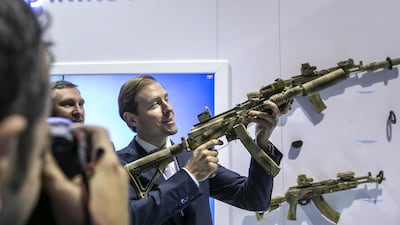Denis Manturov remembers being Russian in America during the Cold War.
As the child of a diplomat, he had the rare privilege of experiencing life beyond the Iron Curtain. Four decades later he is Russia’s minister of trade and industry and the man entrusted by Vladimir Putin to protect the country’s US$40 billion in annual exports in the face of sanctions imposed over the conflict in Ukraine.
He still recalls what he describes as the “cautious looks” reserved for his countrymen when New York was his temporary home.
“These days are coming back,” he says. “It is funny. I never expected these days would remind us of back then.” He is not the first observer to allude to the dawn of a new Cold War a quarter of a century after the fall of the Berlin Wall.
And as the sabre-rattling of old returns between Washington and Moscow, he remains defiant.
Asked for his response to the threat of new and “serious” sanctions against Russia made over the weekend by the US secretary of state John Kerry, he switches from English to his mother tongue.
“This question I will answer in Russian,” he says. His translator is barely able to keep up.
“It is useless to use fear against us because we know what is fear. In our history nobody has ever managed to receive a positive result from the use of force and pressure on our country. Of course it is uncomfortable, and we don’t like to find ourselves in this situation, but there is no such situation without a solution.”
He is not going to let Mr Kerry rain on his parade. After he has vented on why sanctions will not work against Russia, the smile returns.
He is celebrating his 46th birthday in Abu Dhabi and has spent much of the day in a series of whistle-stop meetings with government officials and sovereign wealth funds.
He talks enthusiastically about plans to develop joint projects with investors from the UAE that include a vast airport project in Cuba.
As Russia becomes increasingly isolated by the West over the bloody conflict in Ukraine, the country is busy looking to forge new trade relationships while its industrial titans are forced to become ever more self-sufficient.
He says that many international companies have opted to move production facilities to circumvent sanctions that may have otherwise hampered or halted their trade with the country.
“Those companies that localised their products in Russia have become very competitive in supplying third countries,” he says. “With the devaluation of the rouble we have the benefit of our products being very competitive – not only locally but outside Russia.”
Mr Manturov arrived in Abu Dhabi this week with the top brass of Russia’s military. The country has much at stake, with some $15bn worth of defence exports last year.
When sanctions hit, arms makers such as Kalashnikov, which had prospered for decades by making the world’s most famous assault rifle, found their export markets shot to bits overnight.
The company was compelled to bring in new investors, target new markets and make new products from drones to boats.
The changes afoot at Kalashnikov, the best known of Russian military exports, are a prism onto how sanctions are reshaping an industry in which Soviet-era structural weaknesses have been exposed by the conflict with Ukraine.
Mr Manturov acknowledges the weaknesses of the old defence industry model.
“The problem of the Soviet military industrial complex was with total independence without the civilian products in the sights of the corporation. It was always about the military. Our main aim now is to have a balance between civilian and military. So you can have a balance and share the technology.”
That model also better supports the flow of technological innovation between military and civilian-focused products, he believes.
“In the past even in the US military companies always fed the civilian space with technology and ideas. But today we are moving faster in the civilian space and transferring that technology to the military. That gives us a sense of stability and strategy in our military complex.”
Russia will need such industrial stability if it is to overcome the political and economic pressures it now faces.
While the minister may not welcome the return of the Cold War, his memories of the old Soviet Union are good ones, he says. And as Russia increasingly looks south and east to develop new trade ties and strengthen existing ones, there is little doubt about where his allegiances lie.
“Russia is not western Europe. We have never been part of the West. We have always been East. We are Eurasians – somewhere in the middle. With our character we are more close to Asia and the East. We are responsible – if we give a promise we will keep it. We try to deal with partners who are also responsible – who are not changing their habits. Today we are friends, tomorrow we are not friends? If we are friends, we are friends forever. It is our character.”
scronin@thenational.ae
Follow The National's Business section on Twitter

